BY SUSAN ROSE
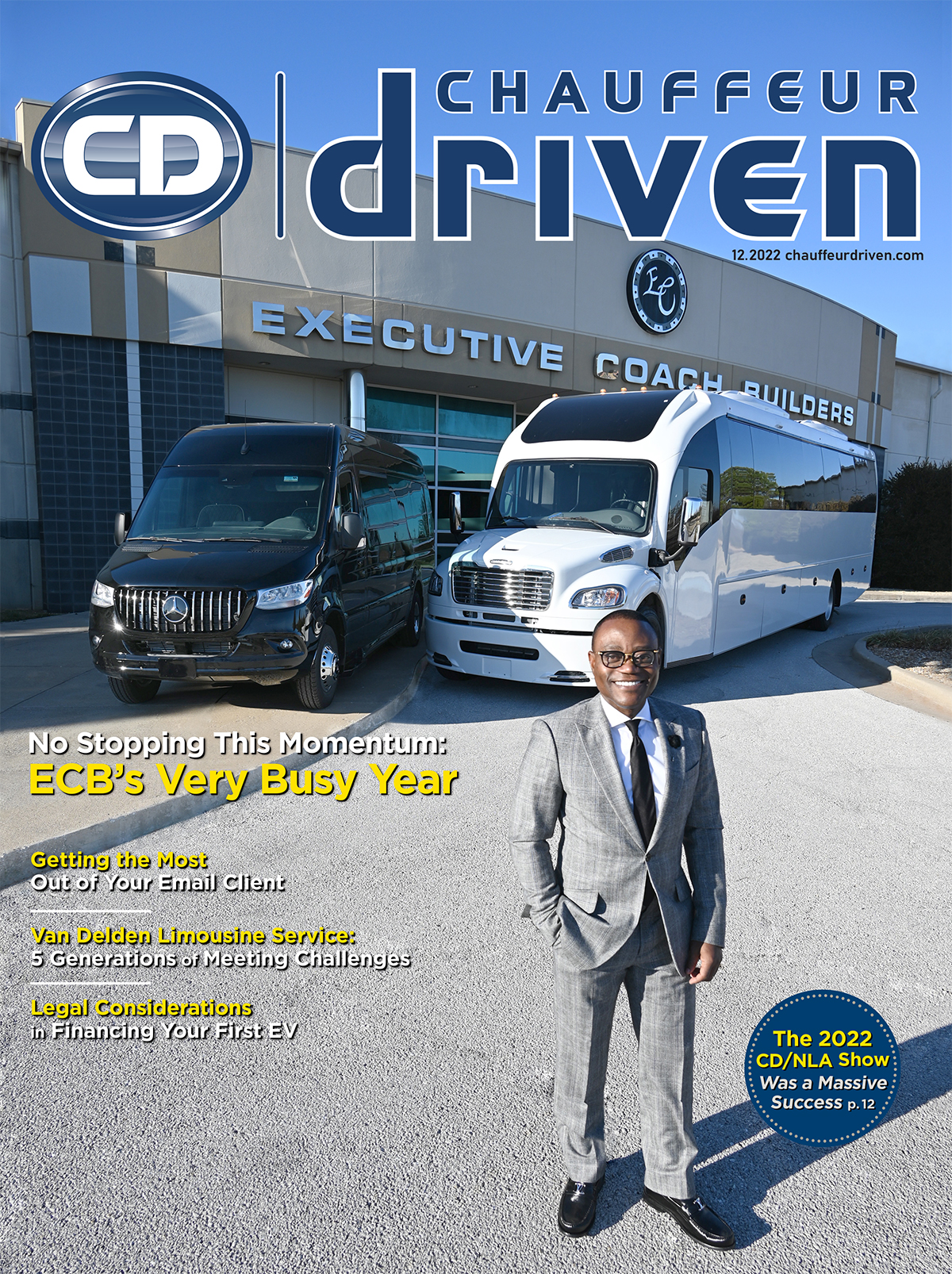 Cover Art: Executive Coach Builders President David Bakare at his headquarters in Springfield, Mo. Photography by Chris Weiss.
Fresh off many successful meetings with new and repeat customers at the recent CD/NLA Show, Executive Coach Builders (ECB) President David Bakare is hustling to fulfill a horde of orders from operators eagerly looking to expand their fleets. Although the hands-on and engaged owner is upfront about the fact that manufacturers worldwide are still in the thick of supply chain interruptions, Bakare isn’t seeing any abatement in the record-high surge his company has been experiencing since 2021.
Cover Art: Executive Coach Builders President David Bakare at his headquarters in Springfield, Mo. Photography by Chris Weiss.
Fresh off many successful meetings with new and repeat customers at the recent CD/NLA Show, Executive Coach Builders (ECB) President David Bakare is hustling to fulfill a horde of orders from operators eagerly looking to expand their fleets. Although the hands-on and engaged owner is upfront about the fact that manufacturers worldwide are still in the thick of supply chain interruptions, Bakare isn’t seeing any abatement in the record-high surge his company has been experiencing since 2021.
“I’ve been in the industry for 30 years and I had to introduce myself to many people,” he says about meeting new operators at events. “You always have a percentage of newcomers in the industry, but I think since COVID and because ground transportation is doing so well right now that it’s attracting new people who have opened their own businesses.”
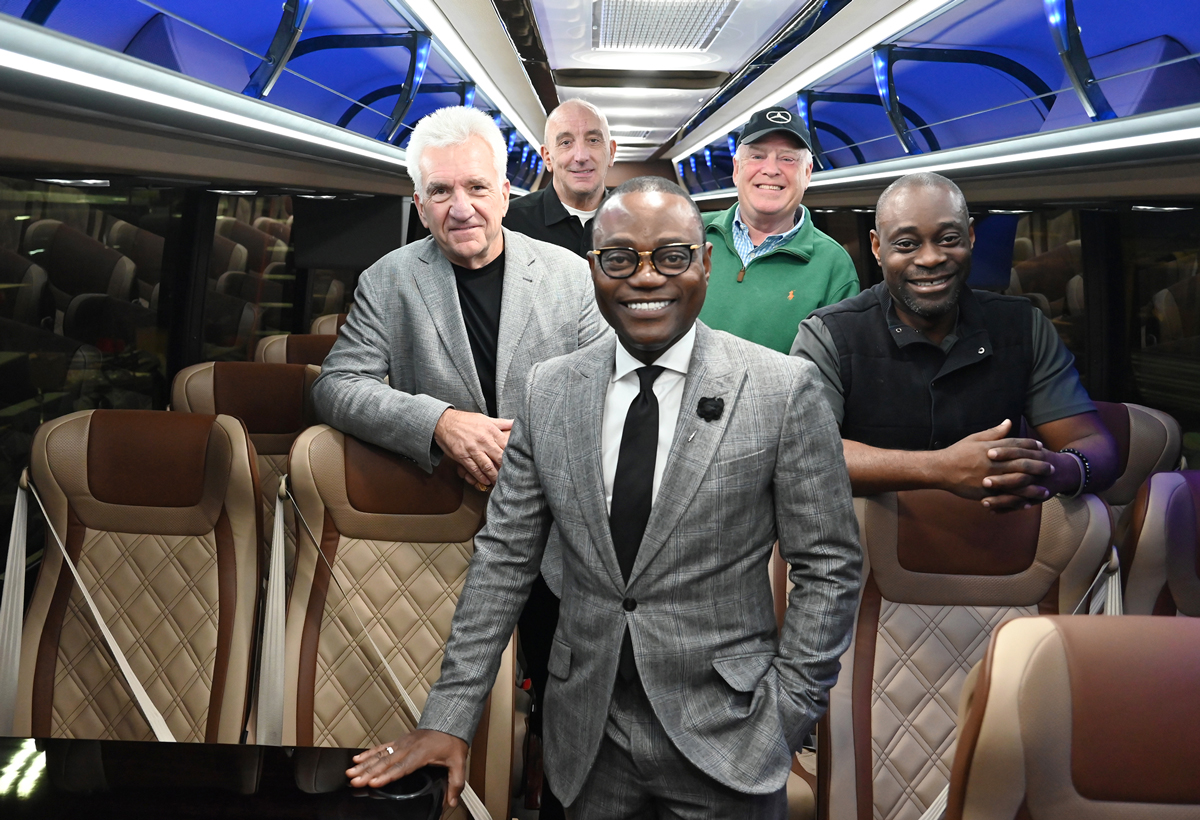 The Executive Coach Builders team (clockwise from center): President David Bakare, GM Rick Fugitt, Sales Manager Tom Fielding, Sales Executive Kevin Gore, and VP of Operations James Bakare
ECB, based in Springfield, Mo., slowed down production in the early months of the pandemic, but never completely stopped—capacity was around 70 percent at its lowest, and they built everything they had on the ground, some to satisfy existing orders and others to stockpile for when things returned to business as usual. Leading up to 2020, ECB poured a lot of time and energy into a fresh and cohesive product line, even debuting its brand-new Chevy Ecoach 38 in the months before the lockdowns, so they were enthusiastic to keep the momentum going. Bakare, who has an engineering background and is actively involved in every ECB product design, and his team are continually improving and tweaking every vehicle they produce.
The Executive Coach Builders team (clockwise from center): President David Bakare, GM Rick Fugitt, Sales Manager Tom Fielding, Sales Executive Kevin Gore, and VP of Operations James Bakare
ECB, based in Springfield, Mo., slowed down production in the early months of the pandemic, but never completely stopped—capacity was around 70 percent at its lowest, and they built everything they had on the ground, some to satisfy existing orders and others to stockpile for when things returned to business as usual. Leading up to 2020, ECB poured a lot of time and energy into a fresh and cohesive product line, even debuting its brand-new Chevy Ecoach 38 in the months before the lockdowns, so they were enthusiastic to keep the momentum going. Bakare, who has an engineering background and is actively involved in every ECB product design, and his team are continually improving and tweaking every vehicle they produce.
“We had the confidence that the demand would return after COVID, so we didn’t shut down our facilities and built what we had since our bus inventory was so low at the time. It was a good opportunity to build a cushion, which turned out to be a blessing in disguise for us because what we didn’t expect was the speed in which we would sell them. We sold out of our stock within three to four months when we thought it would last us a year or a year and a half. The vehicles went that quickly. Then it was the inability to replenish because we couldn’t get chassis,” he says, adding that he has a very positive outlook in spite of current limitations.
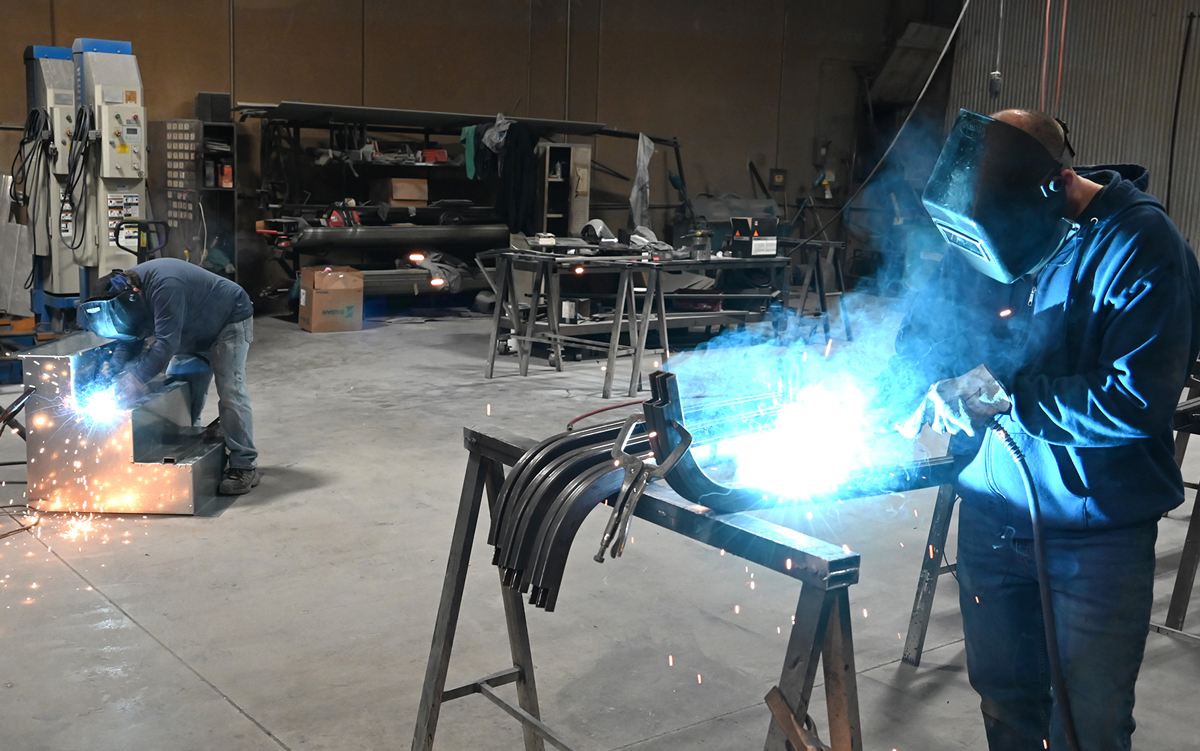 Various stages of the build process
Now in its 46th year, ECB is in a fortunate position within the industry, equally due to its strong product line, relationships with operators and OEMs, and a bit of chance. As the events of the past few years have unfolded, some bus builders have scaled back their offerings or exited the space altogether, giving ECB an advantage to capture a bigger piece of the business. And with customers craving all types and sizes of builds, every category in their diverse lineup—from their Supercoach XL and Freightliner Widebody Megacoach (the “icon vehicle of ECB’s product line”) to their Sprinter and custom Diplomat SUV or van—are red-hot sellers.
Various stages of the build process
Now in its 46th year, ECB is in a fortunate position within the industry, equally due to its strong product line, relationships with operators and OEMs, and a bit of chance. As the events of the past few years have unfolded, some bus builders have scaled back their offerings or exited the space altogether, giving ECB an advantage to capture a bigger piece of the business. And with customers craving all types and sizes of builds, every category in their diverse lineup—from their Supercoach XL and Freightliner Widebody Megacoach (the “icon vehicle of ECB’s product line”) to their Sprinter and custom Diplomat SUV or van—are red-hot sellers.
“The bigger question is what chassis can I get because everything I build, I can sell,” he says. “Everything hinges on that situation. But we have a range of vehicles from small to extra large that feel like they are part of the same family—that’s by design—which we think the industry is going to enjoy once the market opens back up.”
Sprinters continue to be a widely used vehicle for a variety of applications, especially as operators balance the resurgence of retail clients in addition to corporate. “Retail has been very good for our industry because operators don’t have to undercut other competitors to secure those clients. Operators are able to generate a lot of new, untapped revenue and avoid fighting over rates,” he says. Plus, they don’t generally require a CDL driver.
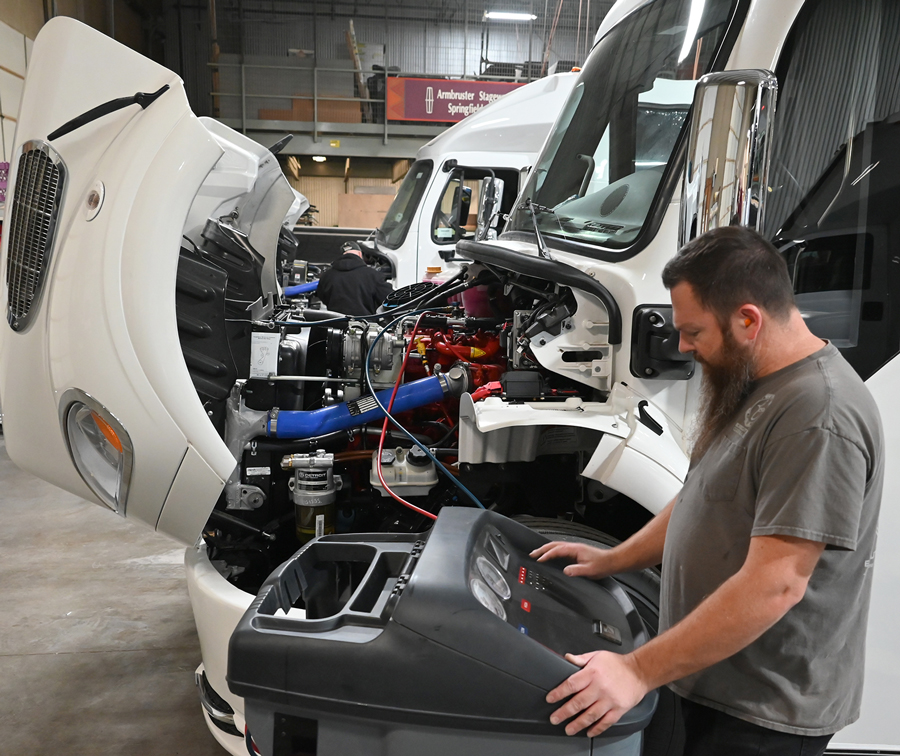 ECB mechanics
“It used to be that operators almost had to have a driver on board before they could buy a bus. It’s still an obstacle for many, but with the lead time it’s taking to get a bus, the smart money is on ordering it and then knowing that they have several months before delivery to find, hire, and train a driver,” he says. “But it’s something that has to be tackled at both ends.”
ECB mechanics
“It used to be that operators almost had to have a driver on board before they could buy a bus. It’s still an obstacle for many, but with the lead time it’s taking to get a bus, the smart money is on ordering it and then knowing that they have several months before delivery to find, hire, and train a driver,” he says. “But it’s something that has to be tackled at both ends.”
Among ECB’s best-selling vehicles is its Freightliner Supercoach XL 57-passenger bus—which Bakare says can match any motorcoach in terms of seating capacity, under-body luggage space, engineering, ROI, and value.
“It’s roughly half the price of a traditional motorcoach, but that’s not the only advantage. The cost of maintenance is significantly lower. For example, brakes could cost several thousand dollars on a motorcoach, but it’s about a tenth of that on a Freightliner. The accessibility to maintenance facilities is huge—there are hundreds across the country. And we all know that downtime is the most expensive part of the business for operators, but with this bus there are more than 800 service facilities that can help you get back on the road. It’s very comfortable, luxurious, and everything you have in a motorcoach you have in the Supercoach,” he says.
Chevy Ecoach 38—which Bakare calls a game-changer—is a midsize bus with seating for up to 38 passengers with luggage. Bakare says thankfully it’s one of the few chassis they’ve been able to secure in large numbers in recent months to meet their overflowing client demand.
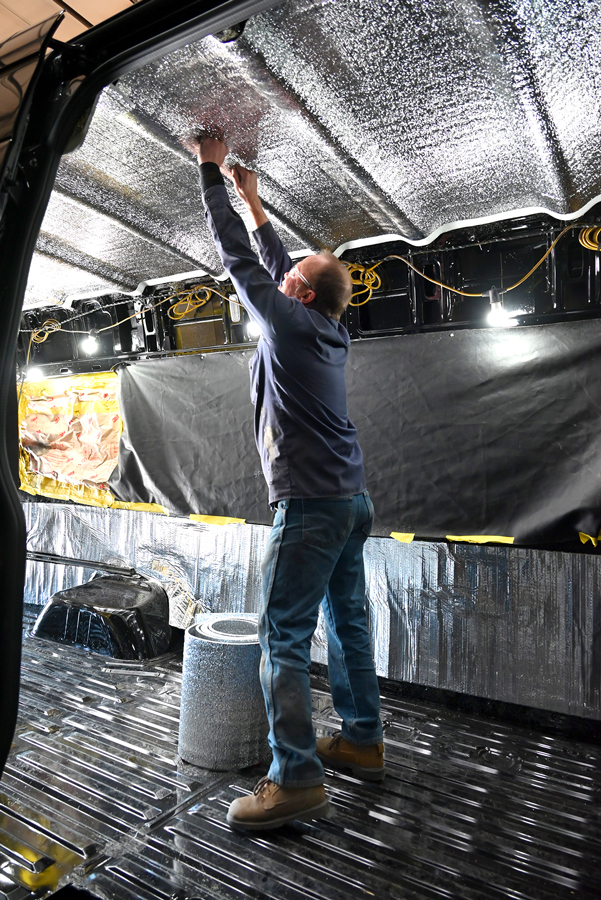 Sprinter insulation
“It’s a terrific midsize product for the 36-38 passenger market, with a 350-horsepower engine, Allison transmission, and a 50-degree turning radius that is even better than the similar Freightliner. It’s a tremendous value at a great price point, so we’re excited about it. We introduced it right before COVID, and the few people who were able to get them are extremely happy and have put in orders for more. We think it’s going to have a great impact on the industry,” he says.
Sprinter insulation
“It’s a terrific midsize product for the 36-38 passenger market, with a 350-horsepower engine, Allison transmission, and a 50-degree turning radius that is even better than the similar Freightliner. It’s a tremendous value at a great price point, so we’re excited about it. We introduced it right before COVID, and the few people who were able to get them are extremely happy and have put in orders for more. We think it’s going to have a great impact on the industry,” he says.
One area where ECB is hitting a slight pause is on stretches. With the retirement of the Lincoln MKT and Continental, Bakare is planning on using up his existing sedan inventory and waiting to see what future vehicles may be endorsed and approved by the OEM as a Qualified Vehicle Modifier (QVM) builder, or Ford’s conversion safety program.
There has been industrywide buzz for more sustainable options such as electric buses and coaches, which are on Bakare’s radar ... but not necessarily for the near future.
“It’s an expensive investment, so I want to make sure that when I introduce it to my customers that it’s not just a prototype, but a properly tested and mature offering that is ready for production. I don’t want to them to purchase a product for a half-million dollars that will be subject to recall after recall, or find out that it doesn’t live up to battery life claims. Freightliner is supposed to be releasing an electric vehicle in the next 12 or 24 months, so it makes sense for us to piggyback on the testing that they’ve done. It’s still a new technology no matter how you look at it,” he says.
Pre-planning for fleet additions is clearly a prudent strategy, but realistically, operators have had to keep their existing metal longer or turn to the used market in the interim. Knowing that time is money for operators, ECB has been stocking additional parts and enhancing their warranty and service departments for a quick turnaround time.
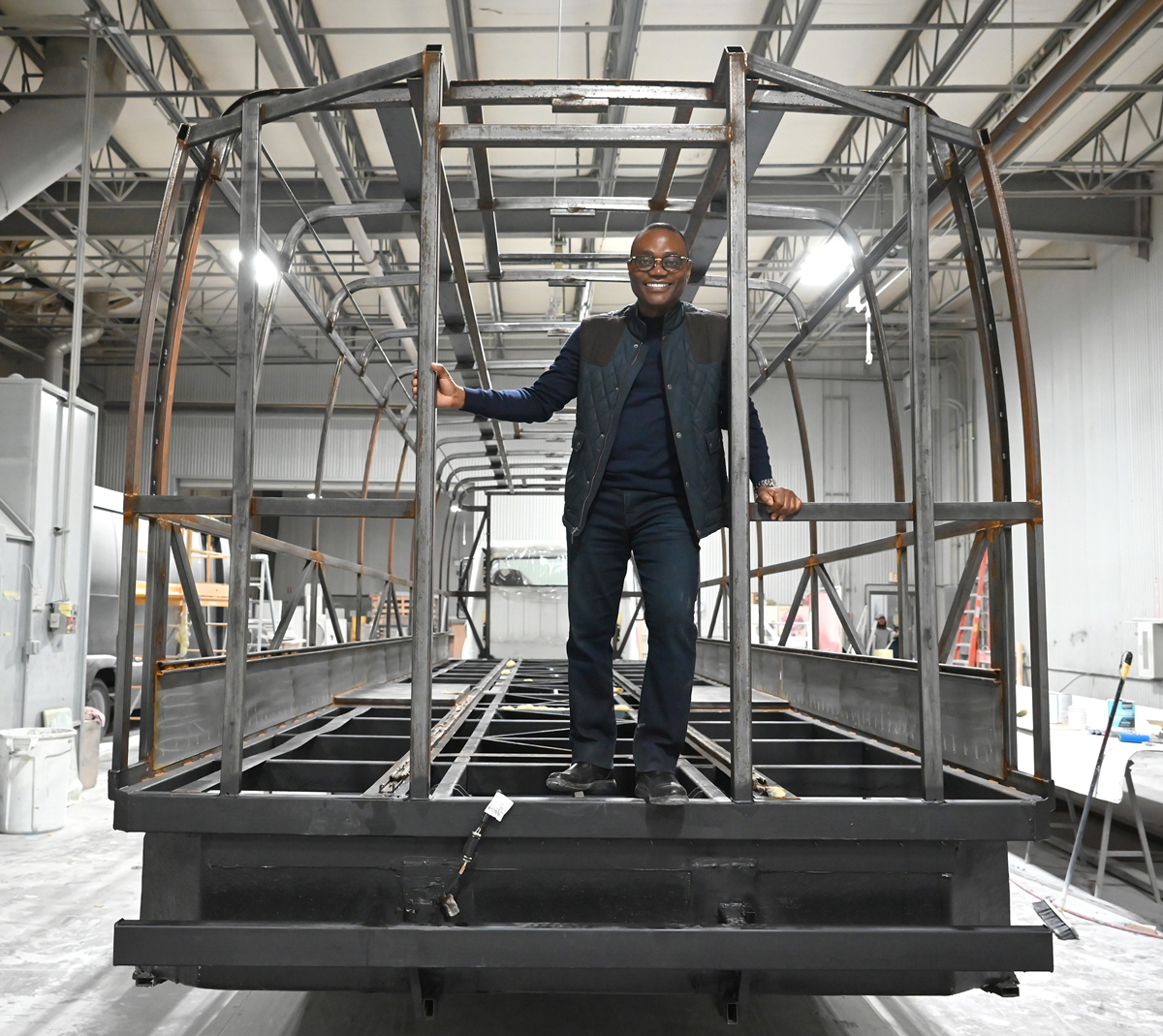 Executive Coach Builders President David Bakare at his facility in Springfield, Mo.
“We have many customers who have 1998 Lincoln Town Cars, some even older, that we help service and get parts for,” he says. “We know we can’t necessarily supply them with new product immediately, so we do everything we can to help them keep those vehicles running just a little while longer and create revenue. And maybe in the future, when that time comes, they remember the experience they had with us.”
Executive Coach Builders President David Bakare at his facility in Springfield, Mo.
“We have many customers who have 1998 Lincoln Town Cars, some even older, that we help service and get parts for,” he says. “We know we can’t necessarily supply them with new product immediately, so we do everything we can to help them keep those vehicles running just a little while longer and create revenue. And maybe in the future, when that time comes, they remember the experience they had with us.”
During the pandemic, the ECB design and engineering team concentrated on making changes to enhance occupant safety and product reliability, an ongoing effort. They committed vast resources so that their products are compliant with Federal Motor Vehicle Safety Standards (FMVSS) No. 227, applying to rollover structural integrity, two years ahead of the 2024 deadline.
Solid product line aside, Bakare is most proud of the work they’ve done to enhance their customer service department—and area he admits needed some attention.
“The only way to improve is to recognize your weakness and fix it, so during COVID we spent a lot of time, manhours, and resources to improve our customer service. We now have four full-time employees in that department because we realized that after-sales service is as important as the vehicle. We don’t want you to have any regrets about your investment. It really makes me happy when we get compliments now instead of complaints,” he says. [CD1222]

